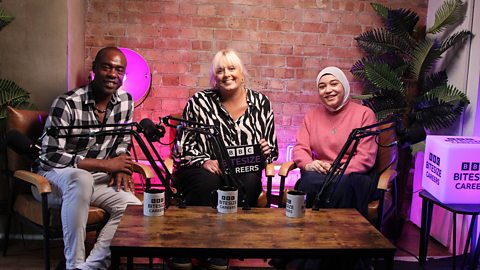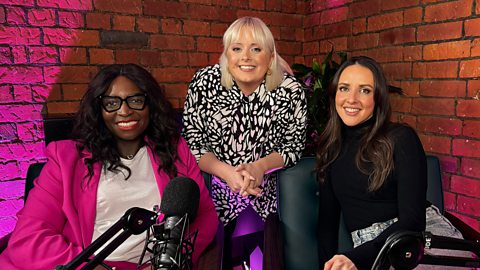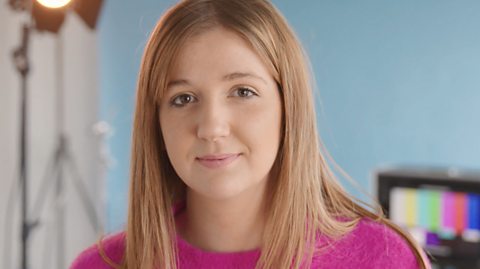The Bitesize Careers Podcast: How can I set achievable goals?
Having goals for your future career can be a helpful way to stay on track but setting and sticking to them is often easier said than done!
Join Radio 1's Katie Thistleton for the second series of The Bitesize Careers Podcast, tackling the most popular questions you've asked about the world of work. In this episode, Katie chats to award-winning careers coach Mark Anderson and student Jammal to answer today's big question:
How can I set achievable goals?
Katie
Hello and welcome to The BBC Bitesize Careers Podcast, where we try and help you figure out your future. Each episode is based on one of the hundreds of questions that you've told us you want the answers to when it comes to your futures. I'm Katie Thistleton, and the big question that we're going to answer from the Careers Wall today is: how should I create goals in my life that are achievable and realistic? So here to help me try and answer this question today is our careers expert, Mark Anderson, who has helped loads of people like you find their path. Hello, Mark!
Mark
Hi Katie.
Katie
And we're also joined by the lovely Jammal. Now Jammal is from east London. He's in a similar situation to loads of you who will be listening and watching. He is passionate about exploring different opportunities, and he's here to learn and share his experiences as well. Hello, Jammal.
Jammal
Hi, Katie. I'm excited to learn.
Katie
Yeah! I mean, you genuinely, you know, you're at that stage, aren't you, where you're like, oh, I don't know what I'm going to do next. So a little bit like our listeners, you want answers to these questions.
Jammal
Yeah. Some big questions we're tackling today.
Katie
Definitely. Well, the main big question we are going to try and tackle is: how do I set myself goals and achieve them? But before we do, I've got a little warm-up game for us. So this game is called Short-Term or Long-Term. I'm going to list some actions, and I want you guys to say whether you think the examples of long-term goals or short-term goals. Does that make sense? Let's do it: sending a CV to a local shop. Is that short-term or long-term, would you say Jammal?
Jammal
Um, I think it's a long-term goal.
Katie
What would you say, Mark?
Mark
I would say short-term, if you're looking for the job immediately and you want that job quite soon. So I suppose it depends on when you actually want the job.
Katie
Yeah. It's hard that one, isn't it? I feel like that one's a little bit of both, because it could be a short-term goal because it could be you're just gonna have a job in that shop for a few months or a year or something, maybe it's a summer job, but actually you could end up working there for years. That might be a long-term goal. That might be the start of your longer term goals. So maybe that one's somewhere in the middle. Okay. Next one: thinking about how much money you'd like to earn when you're older. Short-term or long-term?
Jammal
I think that's definitely long-term.
Katie
Yeah, I would say.
Mark
Yeah. Long-term. Yeah. Yeah. I think the clue’s in the, “when you're older”. So uh, yeah that's a long-term thing.
Katie
Yeah. So sort of thinking, right, what kind of lifestyle do I want when I'm older? How much money am I going to need for that?
Mark
Yeah.
Katie
Therefore what job do I want to be looking towards? That's definitely…
Mark
Yeah. Long-term goal.
Katie
Long-term, looking towards the future. Yeah. And one more: looking at the qualifications needed for your dream job. Short-term or long-term?
Jammal
I think that's also a long-term goal as well.
Katie
Would you say so, Mark?
Mark
I would say it's a bit of a mix because if it's about your dream goal, dream job, that's a long-term thing. But the qualifications might be more immediate. So it's a bit of both maybe.
Katie
I think what we've learnt here is that there's a little bit of a grey area between short-term and long-term goals, because something might be short-term - it's happening very soon, you're going to do that exam, get that qualification - but actually that has a bearing on your longer term career and life, doesn't it?
Mark
Very true.
Katie
Okay. Great. Are we feeling warmed up?
Mark
I think so.
Katie
Mark, let's sort of dive into this now then, and think about how we can set these sort of goals, and how we can achieve them, more importantly. How does someone go about setting both short-term and long-term goals, would you say?
Mark
I think certainly in terms of long-term goals, the first thing is: make sure your long-term goal’s exciting, because if you're not going to be excited and really driven by that goal, you're less likely to want to achieve it. So it needs to be exciting when you think about what that goal is, and you also need to have a strong reason why you want to achieve that goal. And that's really important because again, if you've got a strong reason why, you're more likely to pursue that, even though it might be challenging and difficult. So I think knowing why you want to achieve the goal is important, and then just being able to break it down and making sure that goal is, you know, is “SMART” - what people say - you know:Specific,Measurable,Achievable,Realisticand Timebound as well.So if you've got all of those ingredients, then you're on your way to setting good goals.
Katie
Would you say you've got a long-term goal, Jammal?
Jammal
Yeah, I think we all do have long-term goals. I'll tell you one of mine is to, like, make sure I'm in a position where I'm happy and I feel fulfilled and compensated in my future career. I still have no idea what that is though.
Katie
Yeah, but that's okay. But I think that's nice. That's nice that you think - I think that's the most important thing, like, feeling content and happy in your job is so important. You know, you're going to go to work every day, probably for a very long time - it's important to be happy. I like a long-term goal because I think I used to get bogged down with little short-term ones and make myself, like, “to do” lists that I never got to the end of. But I think sometimes when you zoom out and you just go, right, what's the long-term goal here? - then that's sort of like, that's the destination, isn't it? And then you go, okay, so what do I need to do now? What are the little checkpoints that I need to do along the way? What's the first step to that? And it's kind of like a little journey to it.
Mark
Yeah, exactly. And sometimes, if you've just got short-term goals, you sometimes don't actually know where it's all going to lead in the end. So it can help to have a long-term goal, even if it's not too specific. It can help you to think, okay, this is all going to lead me to this point.
Katie
So you've got that long-term goal that you want to be happy and content in your job. Do you think there's like a short-term little steps to take then? What would be the next step, do you think? For you?
Jammal
I think a short-term for me is making sure that I'm able to pursue higher education, because I think that's definitely important to having a wide range of options when it comes to career choices.
Katie
Great.
Jammal
Definitely.
Katie
Good. You got your long-term goal. You got the short-term goal. Excellent. We smashed it. Um, is it all right to sort of start small and figure out things as you go, then? So like Jammal, Mark, he knows he wants to be happy and content in his job day to day, but he doesn't know what that job looks like. Is that okay? Can you still set off on that path?
Mark
Yeah, definitely. You know, because we can get a bit stressed when we think, oh, I don't know what my long-term goal is. And, you know, if you are taking small steps that will help you to be the person that you want to be. You know, you say you want to be content in your work and things like that, as long as you're getting a broad range of experiences, your aim is to be employable, not just about being employed. So you need to be doing the things, the small little things over the next few years that will help you to be employable. So when you're applying for jobs, your, you know, your future boss could be looking at your CV and thinking, oh wow, he's got some really good experiences there.
Katie
Right?
Jammal, it's over to you now. I'm going to pass you this because I believe you're going to read us some questions from the Bitesize Careers Question Wall.
Jammal
So our first question from the Career Question Wall is: how will you know if you're meeting your goals?
Mark
Well, I think if your goals are measurable, you can review them and see where you're at with those goals as well. So if you're working towards something, you can review it and then you can adjust it if necessary or, you know, tweak your little goal to make sure that you're going in a faster direction or a better direction. So, you know, you can always review your goals, and that's why it's important to be to set measurable goals.
Katie
Some are more measurable than others, I guess. Aren’t they? If it's like: get this qualification or…
Mark
Yeah.
Katie
You know, that's - get this job - that's measurable. But others might not be.
Mark
Yeah, that's true. And that's why it's really important to always be reflecting on your goals and making sure that, um, whatever you're doing on a daily or weekly basis is taking you towards your bigger goal if you have one.
Jammal
Yeah. So the next question from the Career Question Wall is: who can you ask for help in achieving your goals?
Mark
There's a wide range of people, I would say. First of all, you can speak to your loved ones, you know, your family, your close friends. They can give you that emotional support because it can be difficult when you're on your way to achieving your goals to actually hit your targets all the time so they can keep you going. But it's also important to speak to people who've been there and done it, people who are experts, maybe people who are doing the thing that you want to be doing in the future. They can give you some really good advice as well.
Katie
Do you feel like you have people in your life you can ask for help?
Jammal
Definitely. I think my mum is like my go-to person when it comes to my goals. But when it comes to, you know, going to the gym, I know a friend to call or like educational advice as well. So I'm really grateful for that network.
Mark
Yeah, it's good to have a broad network of people who can help you with different areas of your goals.
Katie
You don't go to mum for the gym advice?
Jammal
I like to plead the Fifth on that one.
Katie
Yeah. It's good. You do need a wide range of people with different skill sets in your life, don't you? And it's important to have those positive people in your life.
Mark
Yeah. And I think, you know, people who are successful and who do achieve their goals, they don't do it alone. They always need that support around them. So yeah.
Jammal
How important then, would you say it is to have a mentor or someone to see as, like, a blueprint when it comes to achieving your goals?
Mark
If you can get a mentor, then that's brilliant, and it really can help you to know what you need to be doing along the, you know, along the journey to achieving your goals. And they can give you encouragement, they can give you the practical support. So yeah, having a mentor is really important.
Katie
Have we got another question?
Jammal
Our final question from the Careers Question Wall is: what can you do if you're not meeting your goals, Mark?
Mark
Well, I think one of the things is to, um, be realistic and be honest with yourself. Um, it's really important that when you're reviewing your goals, if you realise that you're not achieving them, it's about saying, okay, what could I do to tweak it? Do I need to change that goal? Is there something else I could be doing that will make me achieve that goal in a better way? So I think really just being realistic with yourself and being honest with yourself is the starting point.
Katie
Great. Thank you very much, Jammal, for all those questions. Thank you to everyone who sent those questions in. Right, it's time for our takeaway task now. So we've learnt loads and now we want to put that into practice. So Mark, what can our listeners and viewers do to make that next step with their career?
Mark
I think when it comes to goal setting, the clearer the idea you have in your mind about what that goal is, the more likely you are to achieve it. So if you can create, like, a vision board and just really visualise what that achieving that goal will look like, you know, draw it, write it down, and then you can look at it regularly to make sure that you're going to be achieving it, because you need to have those constant reminders of what you're wanting to achieve.
Katie
Right. So, Jammal, I'm gonna put you on the spot now. What's on the vision board? Give me give me three things that you're going to go away and work on today.
Jammal
I think one thing that's definitely on the vision board, maybe not work on today, but in the future is like…
Katie
Not today.
Jammal
Definitely read more. Like, of course, everyone might not be fortunate to have a mentor, but someone's definitely written a book on, like, whatever topic you're interested in. So I think reading more means that I'm always going to have that little bit of wisdom next to my shelf.
Katie
So sticking a book on the vision board, what else is on there?
Jammal
I think another thing on the vision board is probably going to the gym a lot more. I think it's important to be active and I want to live, not just longer, but live a more full life as well.
Katie
Right, we'll stick a picture of some dumbbells next to the book. What's the third thing that's going on the vision board?
Jammal
I think the third thing on the vision board is just probably - it's gonna sound weird, but it's probably going to be my passport because I want to have lots of stamps in it by the time, like, I'm old, like, I want to be able to travel to other countries and just immerse myself in other cultures, to be honest.
Katie
Jammal, that is such a good vision board. I absolutely love that. I hope that's inspired you to create your own. And remember, you don't have to do it all at once. You can start small, you can keep adding to it, can't you, Mark?
Mark
Yeah. And I think, you know, it's important to remember nothing is set in stone. So if you need to review your vision board you can do that. You might need to make small tweaks - that's no problem.
Katie
Amazing. Well, that's all we've got time for today. But thank you so much for joining us. And thank you so much to Mark and Jammal for all of your insights that you've shared. It's been really helpful, I think.
Mark
And thank you, Katie, and thank you everyone.
Jammal
Thank you. I really enjoyed this.
Katie
Yeah, me too. I feel like I've learnt a lot. So hopefully you have as well. And don't forget you can check out the Bitesize Careers website for loads more information on stuff like setting goals, and we'll see you next time on The Bitesize Careers Podcast. Bye!
Mark Bye!
Podcast key moments
- Introduction from Katie: 00:00
- Short-term or long-term warm-up game: 01:10
- Your questions answered:
- How do I set short-term and long-term goals?: 03:01
- Do you have a long-term goal Jammal?: 03:56
- How do you know if you're meeting your goals?: 06:21
- Who can you ask for help in achieving your goals?: 07:15
- How important is it to have a mentor?: 08:28
- What can you do if you're not meeting your goals?: 08:51
- Takeaway task: 09:44
- Final words from Katie: 11:14
Top tips for setting career goals
- Short-term and long-term goals are connected. There are often steps towards your future plans that you can start taking immediately. These are little checkpoints along a longer journey
- Make sure your long-term goal is exciting! Have a strong reason why you want to pursue it. It can be a north star that you build your short-term goals around
- Your goals should be SMART: Specific, Measurable, Achievable, Realistic and Timebound. Timebound means they have a deadline you're aiming for
- Successful people don't do it alone. Reach out to people you trust in your life for support and advice. You can also reach out to experts in the area you're interested in
- Be honest with yourself if you're not achieving a goal. Ask if the goals is realistic or if there's something you need to be doing to help yourself.
Takeaway task
Think about something you want to achieve in the future. This should be a long-term goal that excites you. It doesn't need to be directly about work. It could be something to do with your lifestyle, your family or your hobbies. It could be a place you want to live or an experience you want to have.
Make a vision board.
Think about how achieving you goal will feel. What will it bring to your life? Use images, words, or anything that you find significant to visualise what your goal means to you.
Don't worry what it looks like to other people, this isn't an art assignment. All that matters is that you are putting down something you want for the future in a concrete way. The only person who needs to find it motivating is you.
Once you've completed your board, think about three short-term steps you could take right now to achieving some of those long-term goals and write them down.
If you enjoyed this process, try making a bullet journal to track your progress towards your goals.
The Bitesize Careers Podcast on BBC Sounds
The Bitesize Careers Podcast. podcastThe Bitesize Careers Podcast
Listen to The Bitesize Careers Podcast on BBC Sounds.

Discover more on Bitesize Careers
The Bitesize Careers Podcast: Help! What am I good at? videoThe Bitesize Careers Podcast: Help! What am I good at?
Join Radio 1's Katie Thistleton and guests to get thinking about your strengths and weaknesses for work.

The Bitesize Careers Podcast: What's my future job? videoThe Bitesize Careers Podcast: What's my future job?
Join Radio 1's Katie Thistleton and our career experts to find out how you can start shaping your future.

The Bitesize Careers Podcast: How to find a job you'll enjoy. videoThe Bitesize Careers Podcast: How to find a job you'll enjoy
Join Radio 1’s Katie Thistleton, careers coach Arit Eminue MBE, and microgravity research scientist Katie King for some top tips.

Setting realistic goals. videoSetting realistic goals
How to achieve while still stretching yourself.

Don’t give up when times get tough. videoDon’t give up when times get tough
How to persevere and keep your eye on the goal.

How to stay positive at work. videoHow to stay positive at work
Keep the end goal in sight and stay positive!
